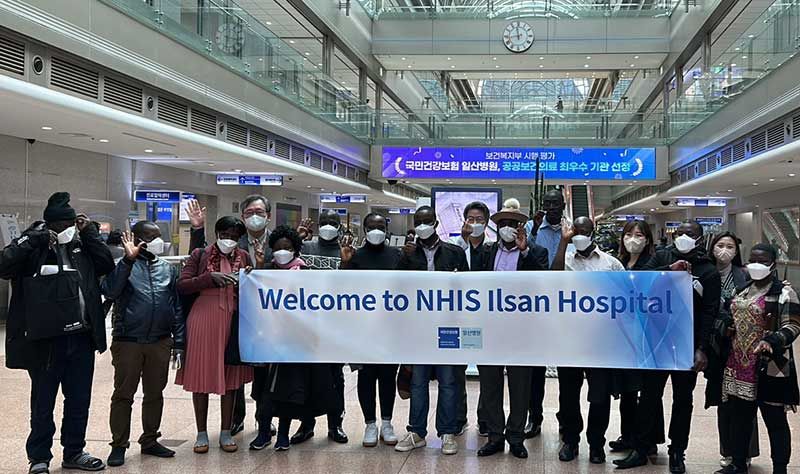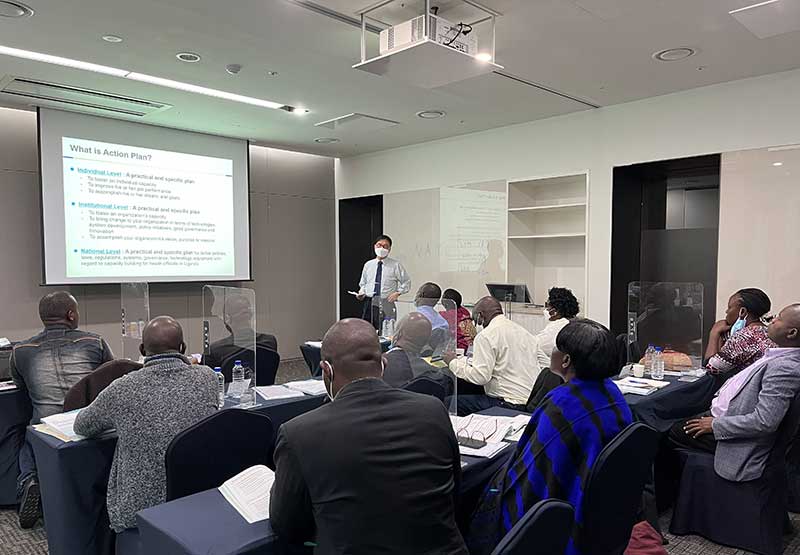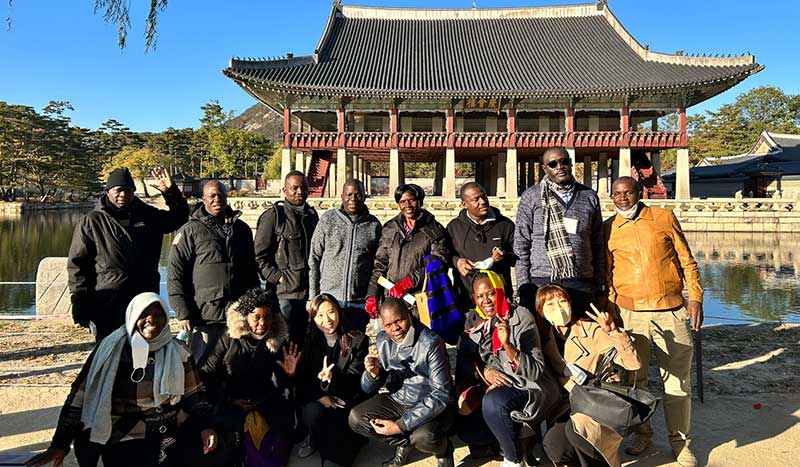
The Government of Republic of Korea offers Ugandan Health Officials an opportunity to experience how an advanced health care system works

Participants pose for a photo after the visiting National Health Insurance Service Ilsan Hospital, organized by Korea Institute for Development Strategy (KDS) (Photo courtesy of KDS)
The Government of the Republic of Korea through Korea International Cooperation Agency (KOICA) and the Korea Institute for Development Strategy (KDS, President Seung-hun Chun) invited Ugandan health officials to the Republic of Korea to share experiences in the development of the healthcare system and improve the effectiveness of health administrative system in Uganda.
The invitational training program was part of the KOICA and World Health Organization (WHO) supported project titled: “Health System Strengthening for Improving Reproductive, Maternal, Neonatal, Child, and Adolescent Health (RMNCAH) Service Delivery in 5 Districts in the Busoga sub-region (2020-2024)”.
The Assistant Commissioner of Infant and Reproductive Health from the Ministry of Health, District Health Officers and Assistant District Health Officers from project districts, and Health M&E Specialist from KOICA Uganda office participated in the training program, which lasted 15 days, from October 29 to November 12, 2022.
To achieve the objectives of exposure learning, a practical based training program was designed by KDS, an international think tank, and consultancy that has been offering performance management services to the Busoga RMNCAH project since June 2022. The program aimed at providing Ugandan officials with an opportunity to review Korea’s development experience and seek development measures for enhancing the national and regional healthcare system in Uganda.

Participants taking a lecture on ‘Action Plan’, provided by professor Kyung-bae Park, the senior vice president of KDS. (Photo courtesy of KDS
The program consisted of lectures, workshops, study visits, and cultural experiences. Lectures covered issues such as the administrative system for healthcare, the primary health care (PHC) system, universal health coverage (UHC) and the experience of Korea, cases of global health cooperation, and action plan building.
In the workshop sessions, participants shared their opinions and fostered approaches for national and regional healthcare development, and respond to pending issues as well as current challenges. The participants drew up action plans by the district to enhance the healthcare system suitable for the regional situation. They also had time to review the details of the action plans, including feasibility and sustainability, and discuss the strengthening of the regional healthcare system with Korean experts.
In addition, the participants visited various health facilities to see the current status of the public healthcare system in Korea. Visiting different types of health facilities, from a local health sub-center and a healthcare post to a general hospital was designed for an in-depth understanding of the function and role of Korean health facilities at different levels for the participants.
“The training program enriched me and indeed all of us in areas of leadership, governance, and national health insurance,” said, Dr. Fredrick Daniel Isabirye, District Health Officer of Buyende district. “In particular, with the development of telemedicine, it was very impressive to see very small healthcare posts communicate and consult with doctors at a higher-level health center about the cases they manage.”
The participants also experienced Korean cultural sites, such as Gyeongbokgung Palace, the Blue House (the former Presidential residence), and Unification Tower to better understand Korean history and culture.

Participants outside the historic Gyeongbokgung Palace
This training provided a learning experience from Korea with an advanced healthcare system, the journey from being a recipient country to a donor country, and how to maximize resources for a responsive health system.
Dr. Chul-soo Kim, Project Manager of KDS, said, “During this training period, Ugandan participants engaged in education with passion and effort, which made a great impression on me, who was in charge of training”. “I am grateful to the participants who worked so hard for the training and I believe that those passions and efforts will make a great contribution to the development of healthcare in Uganda,” he added.
As a performance management service team, KDS will visit Uganda with emphasis on the project districts once every half year and continuously contribute to enhancing the performance of the RMNCAH project through close cooperation with the implementing agency, WHO Uganda, the Ministry of Health, and the Local authorities.
What is RMNCAH Project?
The project titled “Health System Strengthening for Improving Reproductive, Maternal, Neonatal, Child, and Adolescent Health (RMNCAH) Service Delivery in 5 Districts in the Busoga sub-region (Bugiri, Buyende, Iganga, Kamuli, and Mayuge)” is funded by KOICA and implemented by the WHO Uganda. It aims to increase RMNCAH service delivery to the communities and improve the capacity of the district health systems by district leaders.
In detail, the project is mainly focused on improving infrastructure and medical equipment for maternal and child health facilities and RMNCAH capacity of health workers, and health governance and administrative capacity. Increasing Sexual and Reproductive Health and Rights (SRHR) awareness raised among adolescents in the community and strengthening the health information system are also dealt with during the project period.
Who is KDS and what is Performance Management Service?
Korea Institute for Development Strategy (KDS) is an independent think-tank and consultancy, specializing in international development and has participated in the RMNCAH project as a performance management service team. The main objectives of KDS for this project are to enhance the effectiveness of the ongoing project through professional and effective performance management and share international and domestic knowledge and experiences. KDS deals mainly with supporting the WHO’s performance management and consulting on principal project elements related to health and architectural fields.
Click on the video below for more on the visit.














Sunrise Reporter
Leave a Comment
Your email address will not be published.